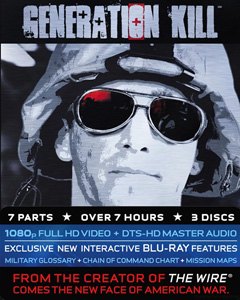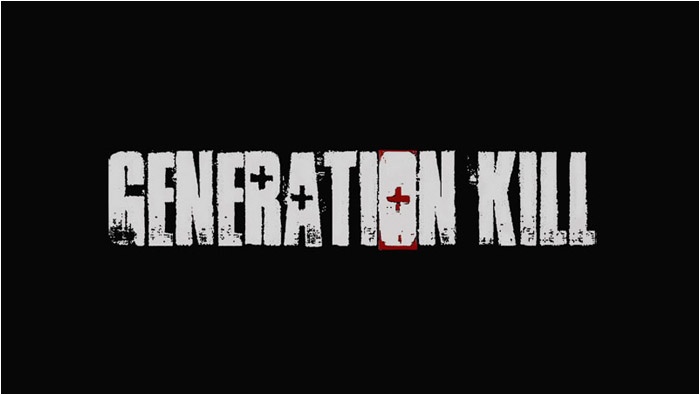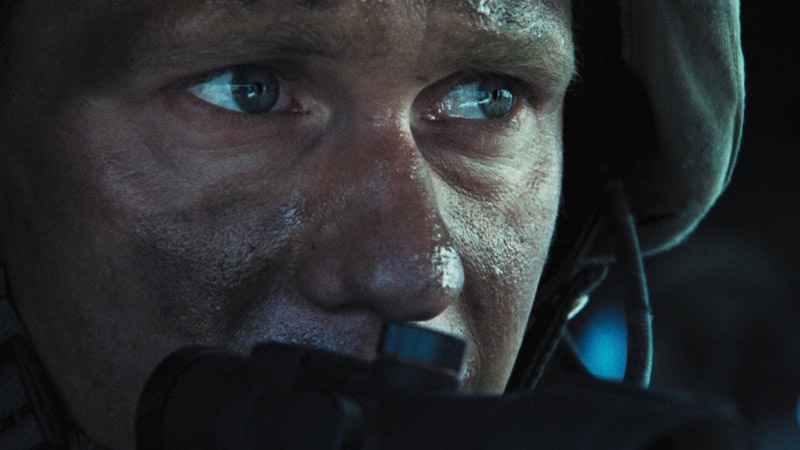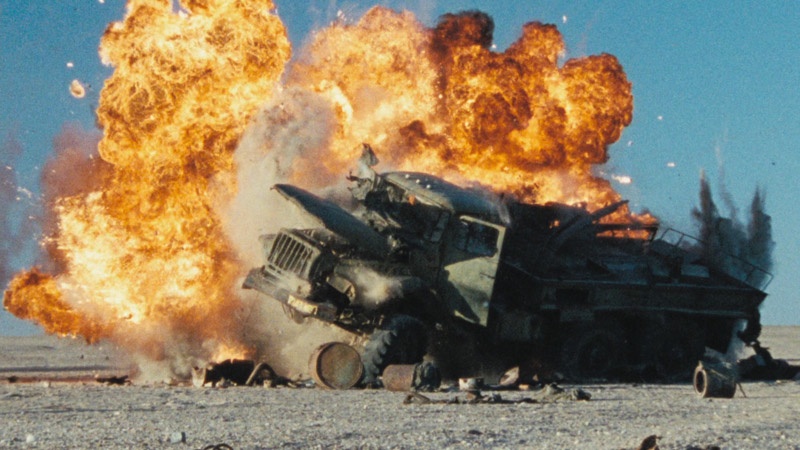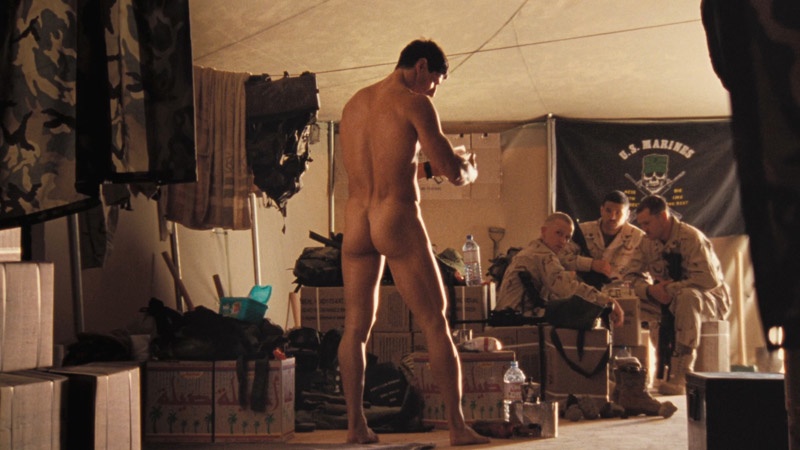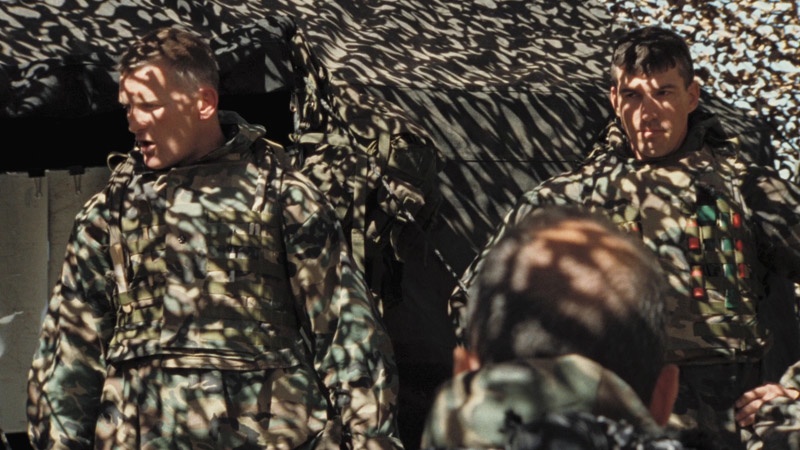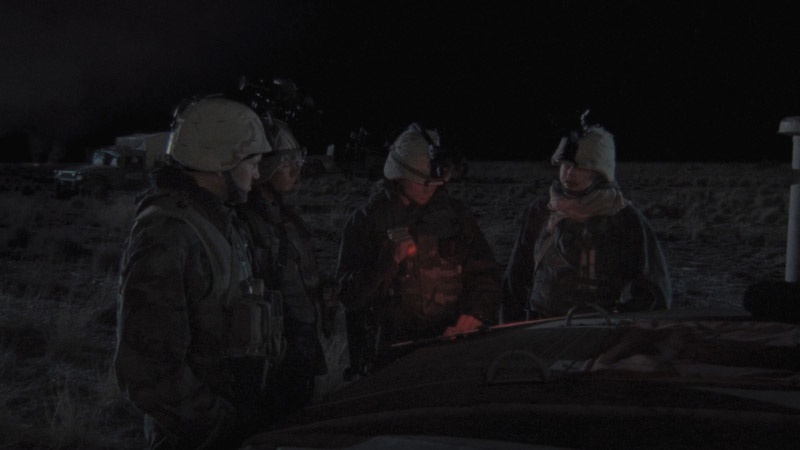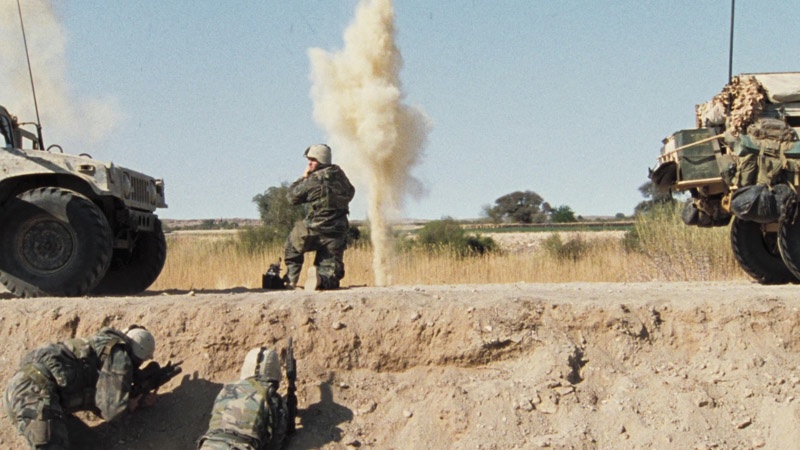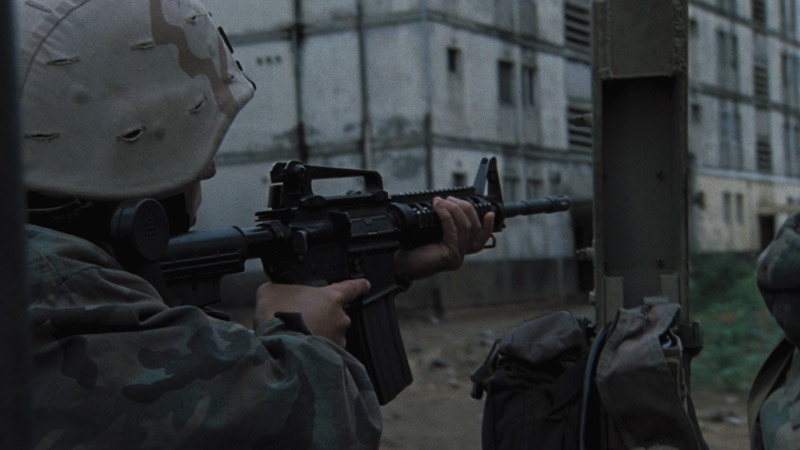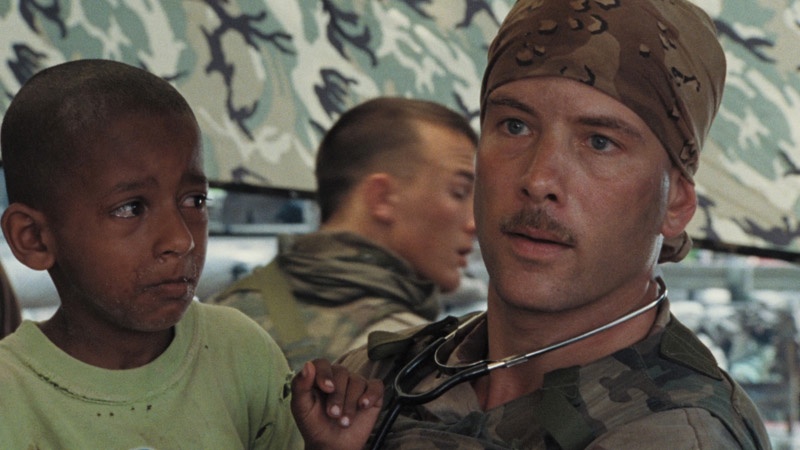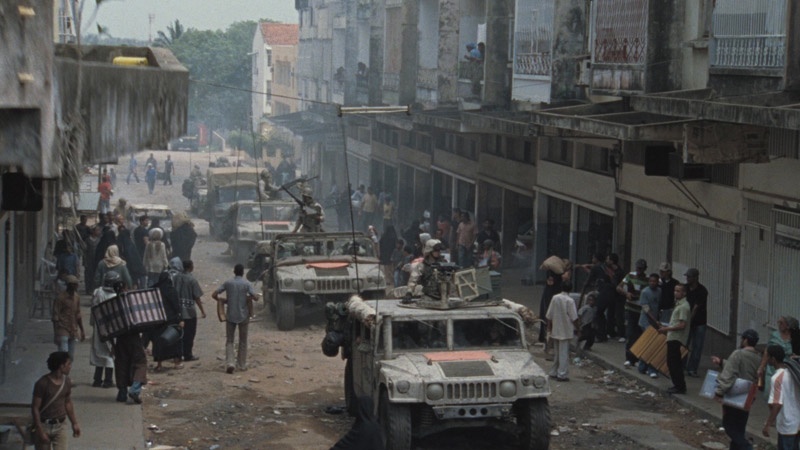Review by Leonard Norwitz
Studio:
Theatrical: HBO Films, Blown Deadline, & Company Pictures
Blu-ray: Home Box Office
Disc:
Region: FREE!
(as verified by the
Momitsu region FREE Blu-ray player)
Runtime: 420 min
Size: 50 GB
Case: Study Gatefold Box
Release date: June 16, 2009
Video:
Aspect ratio: 1.78:1
Resolution: 1080p
Video codec: AVC
Audio:
English DTS-HD MA 5.1; French & Spanish DTS 2.0
Subtitles:
English SDH, English, French, Spanish, Portuguese, Danish,
Swedish, Norwegian & Finnish
Extras:
• 6 Audio Commentaries
• A Conversation with 1st Recon Marines – in HD (23:25)
• Making Generation Kill – in HD (235:05)
• Eric Ladin's Video Diaries – in HD (30:09)
• Deleted Dialogues – in HD (ca. 15 min.)
• Military Glossary, Chain of Command Chart & Mission Maps
The Film:
There's an emotional punch to "Generation Kill" that war
buffs and informed readers know is coming, but the series
manages to build the inevitable nature of combat weariness
into a compelling (and often damning) narrative. When we
first meet the characters in "Generation Kill," they are
clamoring to get in the action. They are tired of faux war
games. They want to "get some." Part youthful exuberance,
part pent-up warriors, they believe in the cause. They
believe in kicking ass. There is a bursting-to-kill element
that you know will, soon enough, come bluntly face-to-face
with reality. It's the varied reactions when it happens that
carry "Generation Kill" to great heights.
–
Excerpt from Tim Goodman's review at the San Francisco
Chronicle located HERE
The Series : 9
I saw Patton when it came out at the height of the Vietnam
War. I remember that both “hawks” and “doves” felt the movie
made their case for them. Patton - the general and the man -
was a hero, a demigod, a military genius by turns. The war
itself may have been a necessary response to rampant evil,
but there are always echoes of “The Charge of the Light
Brigade.” Tolstoy observed in “War & Peace” that battles are
won by soldiers, not generals, even though generals and
politicians could be responsible for losing them. We suspect
that it was always so. Generation Kill seems to argue that
just because one side has a superior technical advantage,
those in charge will continue to find increasingly creative
ways to undermine the efforts of the grunt soldier.
I think it’s fair to say that after WWII, the U.S. hasn’t
had much success in providing heroic backdrops for war
movies. Individual heroism, yes, but not for the conduct of
the wars themselves. John Wayne’s Green Berets was
unsuccessful for artistic reasons, but it was always an
embarrassment in purely political terms. Oliver Stone’s
Platoon and Francis Coppola’s Apocalypse Now! looked at that
same war as a psychedelic, metaphysical proposition, with
its twisted political nature very much front and center.
Wherever you come down on the politics of the U.S.
deployment, war, occupation – call it what you will –
Generation Kill, is a series that, perhaps even more than
Patton, will satisfy all points of view. Given America’s
increasingly dismal, or at least problematic, track record
in wartime since WWII, it comes as no surprise that a series
about the 1st Recon Marines who lead the assault in
President Bush’s war against his father hasn’t a shred of
romanticism or sentimentality about it. The image seems
monochromatic and overexposed – something like the Marines
themselves. There is no musical soundtrack, save the banter
between soldiers that sometimes evolves into song. No pop
tunes, no orchestral swells at moments of crisis, truth or
irony. The huge cast tends to blur into a melisma of
gruntspeak.
At the same time, there is a devotion to duty, to the Corps
and to the mission, that develops into a singularity of
purpose that is palpable and honorable, in the best sense of
that word, even as it comes into contrary contact with the
casual devastation these young men are capable of.
Rolling Stones' journalist, Evan Wright was imbedded with
the Marines from the start of their assault. Out of their
exploits came a book, and out of that, a seven-part series,
in which he remained intimately involved - produced and
co-written by David Simon and Ed Burns, fresh from their
heady success with HBO’s five-season examination of the life
of an inner city, The Wire.
Brits Susanna White (Bleak House) and Simon Cellan Jones
(Our Friends in the North), divided directorial chores. A
number of Marines who participated in the initial assault,
reprise their efforts for the series - most notably, Sgt.
Rudy Reyes – or provide technical support. Some of the
actors are cast for their 1000-yard stare, most notably
Alexander Skarsgard (True Blood) as Sgt. Brad Colbert;
others for their dedication, vulnerablity and humanity, like
Stark Sands (a newbie) as Lt. Fick; their tenacity, like
Chance Kelly as "Godfather" Lt. Col. Ferrando; or their way
with snappy dialogue, like James Ransome (The Wire) as Cpl.
Josh Person; and always: the jawline.
Excerpt of review from SF Gate located HERE
Image:
7/8
NOTE:
The below
Blu-ray
captures were taken directly from the
Blu-ray
disc.
The first number indicates a relative level of excellence
compared to other Blu-ray video discs on a ten-point scale.
The second number places this image along the full range of
DVD and Blu-ray discs.
The bright, arid desert that is the back-, middle- and
foreground for Generation Kill often leaves with a colorless
image, especially in the early episodes before the Marines
enter the larger towns. It is likely not the transfer that
is responsible for the picture’s rather thin, soft image,
with its touch of grain that further decouples a clear and
immediate individuality for the soldiers. It’s difficult to
tell if there is any edge enhancement in a field as bright
as this, but I think not. The night scenes are pretty much
absent any noise. OK, this is not Kill Bill, but somehow it
seems "right" as we get some. Bit rates are generally well
into the upper 30s.
CLICK EACH
BLU-RAY
CAPTURE TO SEE ALL IMAGES IN FULL 1920X1080 RESOLUTION
Audio & Music:
7/x
The first thing we might be aware of is that there is no
music track. That’s nothing if not ambitious for a
seven-hour series. The documentary feel is supported by the
effects track, up to a point. The fire from small arms,
automatic weapons, artillery, and air strikes is convincing
enough, but there is a snag - and it’s one that shows up in
most movies and television shows: a disconnect in time
between the flash of fire and the sound of it. There can be
no doubt that the decision to make these moments coincide is
a deliberate and conventional one but, in my opinion, it’s
an opportunity missed.
I can see that for much of the automatic weapons fire or in
the heat of multiple exchanges, my preference for realism is
utterly impractical: there’s such a thing as too much
confusion. But in isolated instanced of distant gunfire and
especially for explosions of 1/4-1/2 mile, it works against
the POV that the filmmakers have otherwise worked so hard to
maintain to have the sound and the sight coincide. This is
obviously a judgment call about which I am sure I am in the
minority.
Carping aside, the effects, whether at long distance (seen
and not seen) or buzzing all around, like the Tomahawk
missiles that emerge overhead and from behind us, are
captured convincingly, though perhaps not with quite the
impact that real fire might have. For instance, a 50mm
machine gun, the default attack-vehicle weapon since WWII,
has the power to kill a person standing
on the other side of a one-foot thick concrete wall. Such
power is not really conveyed in audio terms even though the
visual effect of it is. The layered dialogue (thank you,
Robert Altman) is the music in Generation Kill, and you can
just make it out if you understand Marinespeak. I found
myself resorting to both the subtitles and the easily
activated military glossary for the first two or three
episodes until I got the hang of it.
Operations:
9
HBO offers an imaginatively conceived, interactive,
translucent grid that brings up details regarding chain of
command, names and aliases of each of the main and important
supporting characters – and there are quite a few of them –
plus the weapons and vehicles employed. The menu offers
quite a bit of summary information before enabling. My only
quibble is the lack of a Play All for the Deleted Dialogues.
Extras:
9
Many points for The "Basic Training" grid that details the
soldiers and their relative place in the chain of command
and which can be superimposed and searched anytime during
the show. I found myself referring to it frequently.
Six of the episodes have commentaries with various
participants: the director, writers, producers, actors who
speak on every imaginable aspect of production – even the
freezing cold African nights – and audience reaction far
less casually and more informatively than is often the case
with so many commentaries.
The bulk of the Extra Features are found on the third disc,
along with the final episode. The Making-of segment is
traditionally, but interestingly, told. Director Sussana
White, along with the various Producers, Writers, Production
Team, and Military Advisors take us through the backstory of
the 1st Recon Marines, their Boot Camp experience, their
Mission in Iraq, the Men who participated in the series, the
African Locations, the Vehicles and Gear.
Perhaps the most fascinating of the bonus features is the
conversation facilitated by Evan Wright with six of the
marines involved: one who plays himself in the series, a
couple of the technical advisors, and Sgts. Antonio Espera
and Brad Colbert Actual. They review their experience in
Iraq and the series.
Since some of the best parts of Generation Kill are the
dialogues, and five of the deleted exchanges are recovered,
minus discarded footage, but along with name rank and photo
ID's. All the Bonus Features, including Eric Ladin's Video
Diaries are transferred in very good quality HD.
|
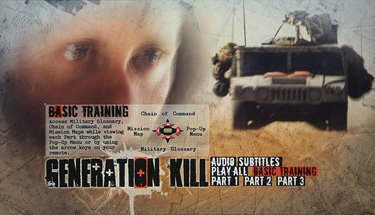 |
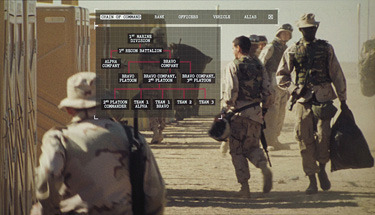 |
|
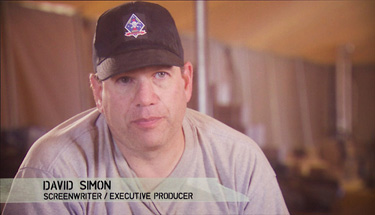 |
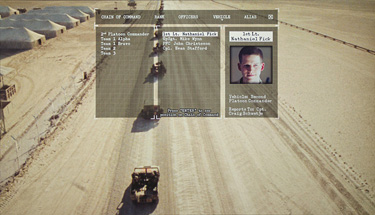 |
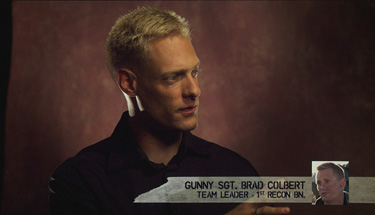 |
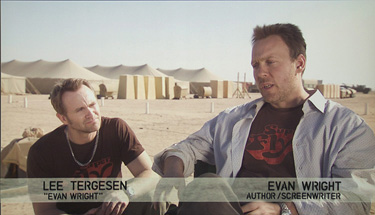 |
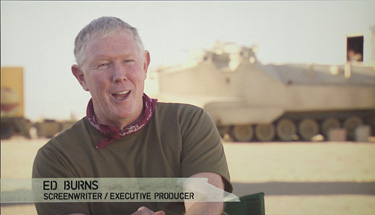 |
 |
Bottom line:
9
The story of the 1st Recon Marines that spearheaded the U.S.
invasion of Iraq in 2003 is told dispassionately, often with
humor, always with an eye for the many truths that must
accrue to such an adventure. The image may not be as "wow"
as we usually get on Blu-ray, but that’s by design. The
audio is always clear and dynamic, if lacking in killing
impact. The Extra Features are welcome. Highly Recommended.
Leonard Norwitz
June 13th, 2009 / January 18th, 2010
![]()
![]()

![]()
![]()
![]()
![]()

![]()
![]()

